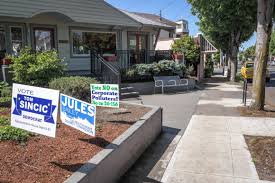BLOG
Every four years, as presidential elections heat up, condominium and homeowners association communities throughout Florida are faced with the issue of political signs being posted in front yards, on balconies, in windows and on and around the common areas. Association attorneys are often consulted, and most would advise associations to be extremely careful with how they create and enforce restrictions that prohibit political expression.
Most associations’ governing documents include restrictions that prohibit residents from posting signs anywhere on the unit or the property. Political signs, however, give rise to issues of freedom of speech, which is protected by the First Amendment.
The key for associations to remember is that restrictions on freedom of speech under the First Amendment apply only in governmental or public settings, so community associations, as private non-governmental entities, are allowed to restrict signage, including political signs, in accordance with their corresponding state law. Some states have enacted legislation specifically addressing the issue, but Florida has not and neither has the state’s Supreme Court addressed the issue specifically.

As a result, Florida’s associations are able to enact and/or enforce rules and restrictions governing the display of signs by their members, but they are cautioned to do so very judiciously and under the watchful guidance of highly experienced association legal counsel.
The process should always begin by reviewing the association’s governing documents to understand the community’s current parameters concerning the posting of signs. If the board and its legal counsel determine that modifications to enhance the existing rules under the community’s governing documents are in order, it is advisable that they undertake the membership voting process for amending the documents with the new regulations rather than adopting the rule as an action of the board.
Boards should also consider adopting reasonable measures, such as the permissible sizes and locations for the signs, how long before or after an election they may be posted, and safety issues including vehicle lines of sight.
Once the regulations are established, enforcement must be fair and consistent. Any partiality by the association in its enforcement actions involving political signs could expose it to legal liability.
Associations should also bear in mind that the election season is relatively short-lived, so any extraordinary efforts that they may take to address this issue may end up only having a minimal impact. By keeping all of these considerations in perspective and working with highly qualified and experienced legal counsel, Florida associations can effectively implement and enforce rules and restrictions governing the displays of political signs in their communities.

